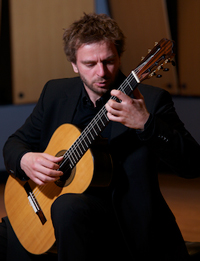by Mike Telin

Marcin Dylla is currently on a twenty-concert tour of North America which in addition to his performance in Cleveland includes his debut at Carnegie Hall. We spoke to Mr. Dylla by telephone and talked about what first attracted him to the guitar and why he thinks the instrument is experiencing a renaissance with audiences around the world. We began by asking him about his program.
Marcin Dylla: Manuel Ponce’s Sonata Romantica is a beautiful piece that he wrote in homage to Schubert. He tried to imitate Schubert’s style and he did it perfectly. In the third movement, Schubert used the title Moment musical for the first time with his piano pieces. There are many small things that are related to his style, like in this case the title. The piece was written in 1928, but it sounds like romantic music. It’s quite a big piece for guitar and lasts around 25 minutes.
Mike Telin: I read somewhere that Ponce and Segovia tried to make people think it was a newly discovered work by Schubert. Is this true?
MD: It is true. At the time Segovia was friends with a violinist who was famous for “discovering” pieces from the baroque period. He would have them published and later confess that they were his own compositions. So, Segovia had the same idea with this sonata. Ponce was a composer who loved to write in the style of other composers. He wrote a piece in the baroque style and the homage to Schubert is another example. And, Segovia wanted to publish it as a Schubert sonata. but in the end realized that it would be completely unfair to Ponce. There is a letter from Segovia to Ponce saying he would like to do it, but then there would be a problem collecting the royalties.
MT: Yes, that would be a problem.
MD: In the end it was OK because Ponce really liked to imitate the styles of other composers and Segovia wanted to have new pieces [written for the guitar].
MT: I was surprised to see a piece by Magnus Lindberg on the program; do you play a lot of contemporary music?
MD: I would like to play more, but most of the presenters are not interested. Every time I see my friends from all over the world I always ask them about new pieces. I was in Finland and I asked a professor in Helsinki if he could recommend some new music from a Finnish composer. The first thing he mentioned was Mano a Mano by Lindberg. I bought the score and as soon as I looked at it I knew it was a wonderful piece. I dedicated a lot of time to learning it and [this tour will be] my first time of performing it in the States.
Composers do admit that writing for the guitar is challenging. You need to really understand the instrument, so it is a difficult task if the composer does not play the guitar. Composers need to take time and learn to understand the idioms of the instrument, what works and what doesn’t.
MT: The Granados, Valses Poeticos is originally for piano.
MD: It is, but the problem is that it sounds like an easy piece but to play it on the guitar is quite complicated. I also think the Diabelli Sonata in F Major is a wonderful piece that is not performed very often. It too is not so idiomatic, and you have to work a lot to make it sound light and in a classical style. It can be described as an easy-sounding piece. But Mozart also sounds easy but it is the most difficult music to play. It is the same with the Diabelli.
MT: It’s always interesting to find out how musicians chose their instruments. Why did you choose the guitar?
MD: There’s nothing really romantic about the story, but my parents asked me to choose an instrument. I spent one day in the music school, visited some classes and at the end of the day I said that I wanted to play the guitar. But to be honest, I don’t know what attracted me to the instrument.
MT: It seems that the classical guitar recital is experiencing a renaissance in North America. Are you finding the same in other parts of the world?
MD: Yes, the guitar in Europe is becoming very popular and I think the main reason is that the new generation of performers are playing very well. They are bringing the level of performance to that of any other instrument, like the violin and piano. In Europe, when I play with orchestras I hear from the conductors that even with the old masters the [level of playing] was not as good as it is with the performers nowadays. Technically speaking, the level of playing has increased a lot and the instruments themselves are also getting better. I also think that audiences are looking for something new, other then the violin and piano, and the guitar is something refreshing.
Published on ClevelandClassical.com April 2, 2013
Click here for a printable version of this article.



